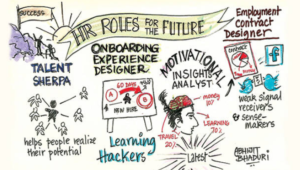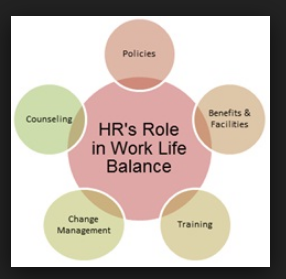HR leaders have found themselves in a new environment of digital teams and digital transformation in general. While there is still a long way to go until the predictions of the digital way becoming the only way come true, the role of HR leaders has to embrace the changes that are coming in order to completely adapt to the new market and help their companies grow.

They also need to effectively highlight that the focus should be on people rather than the technology.
Role of HR … The Digital Workplace
Many companies are creating digitized systems, creating digital products or ensuring that their products are available in the digital world. They are also working towards ensuring that they have the right competencies for the future and that they are developing ways to work more effectively.
HR has the dual challenge here – in developing and transforming new HR operations and transforming the workforce and the way companies work as well. There are three places where this change has to happen.
The digital workforce – Designing practices which attract top talent, hiring people who are digitally savvy and creating a culture where innovation is the key.
The digital workplace – Making sure that teams can communicate effectively through digital tools and modern means of communication.
The digital HR – Creating and establishing digital tools and various apps which can help create better HR solutions.
Role of HR … Technology and People in Communication
Since technology is such an important part of the digital transformation, companies tend to focus on that. However, people are an equally important part of this transformation as well as effective and transparent communication.
With any change that has ever happened, the key always was ensuring that employees are on board for the change and that they are engaged.
This is the key – people and various professionals have different levels of ability when it comes to technology and adaptation to new things. HR leaders have to work to find ways to make digital transformation entertaining and effective.

Bring together the teams in a company game which tests their tech skills in a fun way. Enable learning possibilities for those who are not as tech-savvy. You should also establish a mindset that fits your company and involves people in that mindset.
Role of HR … The Cost Of Change
Too many HR leaders are focused steadily on what’s available to them rather than building a mindset in their organization.
Some companies have the technology at the core of their industry focus and some companies are embracing the digital transformation in different ways. But organizations often don’t have the same budget for the change so there are ways to encourage the digital change in other ways.
“Some leaders have experimented with available resources while waiting for investment to be approved. Some have also encouraged their teams to bring new ideas to the table, to think in a creative way and so on.
This shows how much better it is to try and fail than not to try at all. When the money is lacking, the real creativity is inspired and HR leaders can bank on this as well as the skills their teams have,” says Flynn Gordon, a data scientist at Australia2write.
Role of HR … Expertise Matters

Managers need support when things start changing. Creating a place for them where they can express their thoughts and concerns freely is a good and beneficial idea. Eliminating the atmosphere of “it’s us versus them” and creating an open and transparent community can help the goals of different departments align.
Communicating is one of the key principles that will lead people to join the change and ensure that both HR and the managers can have this expertise to lead to change.
One of the main things to consider is the race of looking for top talent. They have to consider talent pipelining, anticipating which skills will be needed in the future and assessing gaps that will happen in the future.
Hiring externally and then upskilling the employees that are already in the company can help ensure that HR managers end up on the winning side of the talent race. Consider the speed of changes involved as well, budgets and how to be in sync by transforming competences.
Role of HR … Creating Innovations
HR leaders are always looking for ways to be ahead of the change and bring innovations to the table as quickly as possible.
One of the ways to do this – bring new things to life – is to adopt the method of breaking big projects into small and manageable tasks that are easier to take on. This also means that the entire team works on every stage until it’s done.
The feedback, fine-tuning and adapting to outcomes can help teams feel empowered and open to learning and accepting new things. One project at a time is one of the best ways to bring high-quality innovations to light with a substantial speed.
Engaging Management
One of the biggest questions is, of course, how to engage the management in such a way that they will opt in for the new digital ways of doing the job.
This is usually hard, mostly because people don’t see the necessity of change if everything is working at the moment. One of the solutions to fix this is to find allies in the business who can help and support the managers and lead by the example.
When others notice wins and rewards of those wins through the digital, it will help remove the fear of the change and it will also enable them to let go of their old ways and embrace the new ways.
Show them statistics, ROI and so on as an effective way to prove the significance and the effectiveness of the digital transformation. You can also show them stats when it comes to talent – how it can improve performance, engagement and their growth in the right direction.
There Are Four Pillars Of Transformation
Digital transformation is often very similar to any other transformation.
First, the company needs to understand what they are trying to achieve from the change. “They also need to think about if their employees have that mindset to support this process.
Then they should decide what they need to do in order to make the change happen,” says Thomas Graph, an HR expert at Brit student.
One of the ways you can look at the transformation, in general, is to see it as four pillars.
Here are those pillars:
The mindset – Are people willing and enthusiastic for the digital changes across the organization? Experts say that this takes up 45% of the effort.
The people – Do you have the specific skills among your employees? This takes up 25%.
The processes – Do you have strategies in place for effective communication and changes? This also takes up 25%.
The technology – Do you have the actual software tools?
The digital transformation – just like any other type of transformation – will always be only as good as the mindset and the people that drive it. Consider these things when supporting your own company through digital changes.
Check out these additional articles on business and its performance in our library:
Adaptation … 5 Awesome Business Examples for Study
9 Secrets to the Chipotle Culture and Employee Engagement Success
Can the Jet Online Strategy Win Ultimate Battle with Amazon?
Working as a Marketing Manager at the Ph.D. Kingdom, Ellen Lawton works hard to help companies create effective marketing strategies. She is passionate about sharing her knowledge and expertise and writes for blogs like Next Coursework and online magazines. Her main goal is to help businesses achieve their goals through marketing.